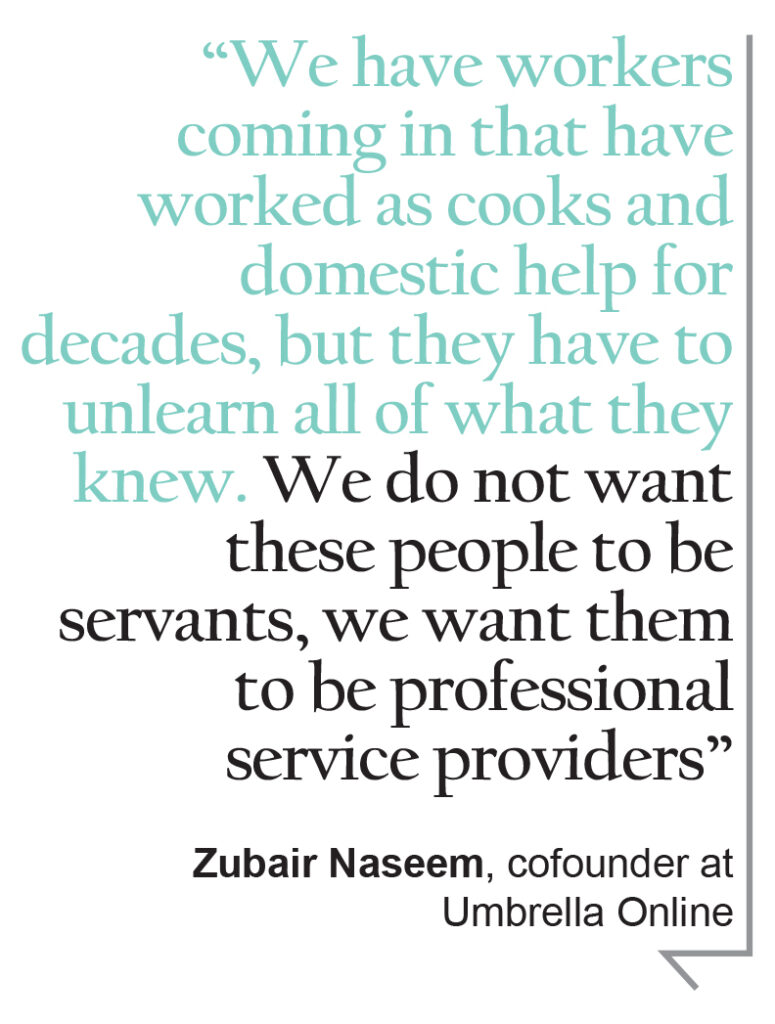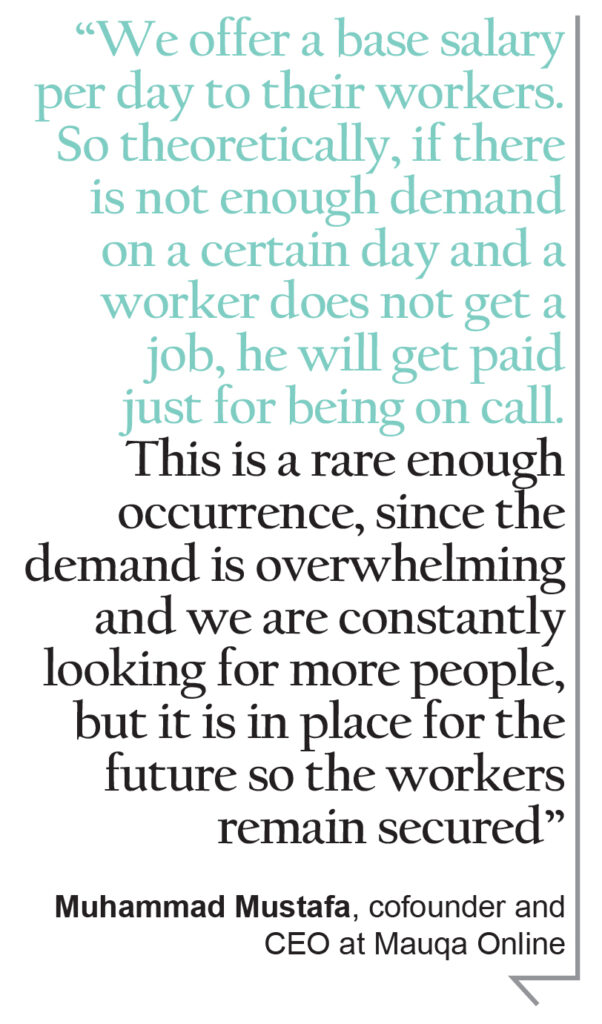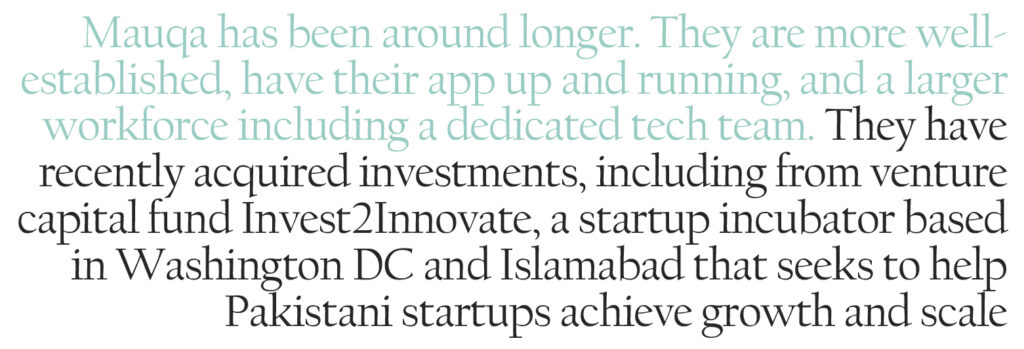Disaster has struck. Your boss is coming over, or maybe it is your in-laws, or even people from school you have not seen in years. You have been planning this for a while, even looking forward to it, but also worrying and making sure everything is perfect.
And that is when it happens. You get the fateful call that your maid is not coming. Something to do with her husband or a wedding or a funeral. And the house is a mess from last night. There was an impromptu party at your apartment, or maybe your children had a sleepover at the house. Whatever it was, your place looks like a tornado ripped through it on the same night it was burgled.
You take a deep breath, tell yourself it is going to be fine, and get cracking on making the place at least a little presentable. That’s when disaster number two strikes. Your cook calls, she cannot make it today because the maid was supposed to give her a ride. And that’s when you panic. The game is up. Time to cancel your plans, slowly slump down, assume the fetal position and wallow in your shame.
Or at least that is how it would play out until a few years ago. Because if you are in Lahore or Islamabad, it is now possible to get on to a website or an app and place a booking for domestic help – ranging from cooking, cleaning, and handymen to child and elderly care. In essence, it is much like Careem, except for domestic help.
Contrary to initial perceptions, however, the very similar services in Lahore and Islamabad are being run by two different companies. At the center of these two different companies are three MBAs from LUMS, and a rocket scientist.
The progenitors of the concept are the power couple of Muhammad Mustafa and his wife Suniya. Mustafa completed his undergraduate education from the GIKI, an MBA from LUMS, and a masters in management from Stanford GSB. Suniya is pursuing her doctorate in aerospace engineering after working for Formula One teams in Europe. The two have been running Mauqa Online in Islamabad and Rawalpindi for the past year and a half.

In the other corner are Zubair Naseem and Ali Tariq, two former LUMS MBA class fellow that have known each other for a lifetime. After decades spent banking all over the world from New York to Dubai, to two had been living quiet lives, when the entrepreneurial spirit struck. It led them to found Umbrellaonline.pk, a service similar to Mauqa Online, but one based out of Lahore that wants to take it up a notch. They have been at it only four months now.
The two parallel services based out of two different cities provide a fascinating possibility. Both in terms of the concept they are bringing to the table, and the possible territorial war that may be on the cards when one or the other decides to expand. For now, the two are operating on a relatively small scale, but the concept seems to be catching on, and demand currently exceeds their capability to supply for both. So, they have not quite drawn up battle plans yet, both wanting to get it right in their respective cities first, yet they recognise that it is an eventuality they will have to face.
What exactly are the services these two companies provide? How are they different, and what have they achieved? More importantly, being branded as social entrepreneurship ventures, what are these companies doing for their workers? And what is their future?
So what’s the deal?
It is simple enough. You go on to the platform for Mauqa or Umbrella, you either call them and ask for a booking, or apply through their website. The two are not at par technologically yet, with Umbrella not having an app.
Umbrella claims that they do not have an app yet because they do not want to get one of the dime-a-dozen app packages that you can modify for your own needs. They want their business to drive technology.
For now, the process is simple. You ask for a worker, the worker arrives, does the required work, gets paid and heads back. Both Umbrella and Mauqa have partnered with Careem to provide pick and drop services to their workers. It is as simple as ordering something online, except in this case it is services, and not commodities.
Moreover, emergencies are not the only situation in which you could make use of Umbrella. For bachelors living on their own, for a maid or a cook to come in a couple of times a week and make them a home cooked meal or clean up their house could contribute a lot towards their standard of living.

The only catch that there seems to be is the lag. Of course, if a service provider is free at the moment because of a cancellation, it will only take so long as the travelling time. But if they are completely booked, which they say they usually are, both services will take their time. So, if you are in a rush, it may take some time, and you would be better off booking a day in advance.
This is one horizon on which Mauqa has Umbrella beat, at least for now, perhaps because they have been in business longer. Mauqa says that any time someone calls or applies asking for a booking, a worker is sent to them within 60-90 minutes. With Umbrella, the minimum regular waiting time is three hours before a worker can make it to your house.
Again, Mauqa has a much larger pool of workers. They have somewhere around a 100 on their force at all times. Umbrella in comparison had a much smaller number. While Ali and Zubair were reluctant to provide an exact number, the understanding was that it was somewhere between 15-20. As a result, the time of each individual worker may be stretched a little thin.
As far as the going rate is concerned, Umbrella is slightly pricier. They will send to your home within three hours a trained and uniformed person to come in and take over for you at Rs300 per hour. Mauqa charges Rs250 per hour, and also have a system by which you can hire a worker for the entire day for Rs1,750.
The going rate at first does not sound like much. But on a little introspection, you realise it is higher than what you would be paying your help on average. On principle, if you were to hire a worker from Umbrella every day for four hours a day, it would cost you Rs 37,200 per month. And if you were to get a worker for the entire day every day of the month, you would be spending Rs 54,250 per month.
Both sets of owners claim that this social entrepreneurial venture is designed not just to turn a profit, but also uplift the workers and eventually, perhaps in the long term, break the traditional mode of domestic help in Pakistan. But one thing is clear from the numbers. Mauqa and Umbrella are never going to be a primary force. Their market is emergencies and substitutions. Perhaps bachelors that need someone to come in every now and then to clean-up behind them, or other professionals constantly on the go.
The team at Umbrella claims otherwise. They are insistent that this is a disruption, which it might just be, but they say it will at some point overtake the traditional structure of domestic help. They point to things such as the efficiency of their service, and the fact that you do not have additional costs such as marriages, births, and illnesses that one often has to bear – and concepts such as servants’ quarters. Mustafa at Mauqa is more realistic, knowing that while it may be a disruption, it is not a revolution. The business has the potential to be big, but it cannot hope to be it.
The workers
They key to the business, of course, is where these workers come from. And if Umbrella and Mauqa can find these untiring, unwavering, trained, and professional workers, why can the average household not get permanent help of this quality?
According to the companies, make a considerable effort to make sure they develop these workers. This is central to their vision of social entrepreneurship, which is based on a desire, they say, that gives back not just to them, but to the workers.
There is little doubt that Mauqa and Umbrella are similar. Mauqa launched early in 2018, and Umbrella only in March 2019. There is also little doubt about where the inspiration for Umbrella comes from. But its owners – Ali and Zubair – brush away the source of the idea as insignificant. What matters to them is how their service is different – and better. And the main difference they have in mind are their workers.

For starters, Umbrella has a robust system of recruitment. The first step in Umbrella’s process is actual field work, as Ali Tariq explains, they actually went out into lower income areas, especially where minorities live, to go and seek out workers. (No time to dwell on what a commentary it is on Pakistani society that they seek out religious minorities for domestic work.)
Once Umbrella has zeroed in on potential workers, they go out of their way to conduct what they claim are the most thorough screening in all of Lahore.
“We take copies of their ID cards and thumb impressions, of course, but we also go to their houses and geo-map their locations. We talk to the locals, we talk to the police, and we make sure everyone is on board. So, if it is a woman we are hiring, we talk to her family and whoever the head of the household is – whether that is her father or husband,” they tell Profit.
In addition to this screening, they also do thorough medical checkups of the people coming on board for things stretching from hepatitis to malaria and all kinds of other diseases.
“Our goal was to only have such people enter your home as we would like in our own and for our kids to be around. So, this is all very personal for us,” says Zubair.
But the process does not end there. For many people, the idea of Umbrella seems like Uber or Careem for domestic help. But their model is a little different, because they do not just connect clients to workers, the workers are employees of Umbrella. And once they have been selected, they take them to training.
The company has offices in Johar Town in Lahore, and on one of the top floors of the building, they conduct sessions for what is essentially a boot-camp-style finishing school for domestic help. In a few weeks, the people that come in are taught everything from presentation to talking skills to time management and conflict resolution. For this, the company has also developed a handbook – one tailored to make their workers the best in the business.
“We have workers coming in that have worked as cooks and domestic help for decades, but they have to unlearn all of what they knew. We do not want these people to be servants, we want them to be professional service providers.”
Indeed, the proposition is attractive for the workers. Not only do they get trained, but Umbrella actually pays for them to be trained by the College of Tourism and Hospitality Management (CTHM), with whom they have partnered.
To their credit, Mauqa does all the same things. They were the ones that established the practices after all. They also conduct background checks and provide training. The only difference is that their outreach programme works a little differently. For one, most of their workers come to their offices instead of them going to the workers. While they do make a point to do basic background checks, they are not nearly as thorough as Umbrella – whose geo-marking, home visits, and medical screening sets them ahead of Mauqa in this regard.
But perhaps the more significant difference is that Mauqa’s training regimen is uninspiring. During the course of this profile, Profit interviewed Umbrella first, and took with a grain of salt their claim of providing ‘trained’ domestic help.
A two-week boot camp, even one managed by the CTHM, is hardly comprehensive. In comparison to Mauqa, however, it seems like a dream. Their approach is to give training on the spot – a one-day run down on soft skills and the most obvious dos and don’ts. After this rudimentary ‘training,’ the worker can be sent out on their first job as early as the next day.

But these are anxieties mostly related to the consumer end and affect the workers very little. In this, Mauqa seems to have a better deal for their workers than Umbrella does.
“We offer a base salary per day to their workers. So theoretically, if there is not enough demand on a certain day and a worker does not get a job, he will get paid just for being on call,” Mustafa explains. “This is a rare enough occurrence, since the demand is overwhelming and we are constantly looking for more people, but it is in place for the future so the workers remain secured.”
“Mauqa also provides a comprehensive health insurance plan to all of its workers and gives them a flexible work environment where they can choose when and how much to work on their own terms,” he adds.
The last part is true for Umbrella as well. The workers are their employees, and not on contract, and can still design their own work patterns. And as they claim, they already have an insurance plan worked out for their workers and are simply waiting to have enough people on board to get it to kick into action. The distinction that remains, however, is that Umbrella’s workers are dependent completely on commission – unlike Mauqa, which provides a daily wage.
Expansionary ambition
There does appear to be a market for the services provided by these companies. The problem, if you want to call it that, is that both Mauqa and Umbrella are currently working on a very small scale. While they are covering entire cities and say that the demand is superseding their ability to supply, they have not yet made any big moves to try and jump right into it.
Caution seems to guide strategy for both Mauqa and Umbrella. For now, both of them want to get it just right. Currently, they have undertaken more than 1,000 hours of training, and more than 35,000 hours served to 2,500 customers.
Umbrella is a smaller operation in comparison – but it is also newer, and burgeoning at that. With only a handful of managerial staff, they try and maintain a steady flow of workers for their recurring demand. In these four months, they have done over 1,100 hours of service, more than 350 households and between 350-400 jobs in a month thanks to the same customers coming back again and again.
The numbers are not huge, especially for Umbrella, but their dreams and hopes for the company are big. “I have no doubt in my mind that this is going to be a huge business, whether it is us or someone else. That is just what the market trends are showing,” says Zubair.
Ali and Zubair have plans to expand, in fact, they are looking at turning Umbrella into something much larger than what people might imagine. But for now, they are not really worried about the competition.
“In Lahore? No one.” That is the blunt answer Ali Tariq gives to us when we ask him whether Umbrella has any competition. But it is also a measured answer, because they are more than aware of Mauqa. And Mauqa has an eye out as well.
“We know Umbrella is out there. For now, we want to make sure we figure everything out in Islamabad. But we are going to have to move into other cities at some point, especially at the rate things are going. We want to go slow, but the demand is often overwhelming,” says Mustafa.
Mauqa has been around longer. They are more well-established, have their app up and running, and a larger workforce including a dedicated tech team. They have recently acquired investments, including from venture capital fund Invest2Innovate, a startup incubator based in Washington DC and Islamabad that seeks to help Pakistani startups achieve growth and scale.
Umbrella, to their credit again, seems bent on improving and perfecting their model before what they say will be a launch with a bang. They are still in their trial phase, and have a full launch with their state of the art app, and a fully trained, client ready workforce slate for a proper launch in a few months time.
As things stand, if anyone is going to expand, it will probably be Mauqa. But Umbrella is also watching closely, fine tuning their product and preparing themselves. And while none of this will be any time soon, it is exciting to see what happens next.




















